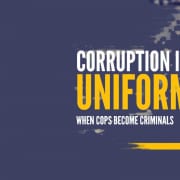|
Getting your Trinity Audio player ready...
|
By Kwazi Dlamini
Heroin’s increasingly widespread use in South Africa receives little attention as a national issue and less coverage in the media. In part two of our series on corruption and heroin use in South Africa, we look at the effects of the drug on users, communities and the police, and we highlight selected recommendations from our source document. Part one looked at the current situation and its various players.
The mini-series is based on a recent report by ENACT, titled Hiding in plain sight: Heroin’s stealthy takeover of South Africa. ENACT is a project funded by the EU and implemented by the Institute for Security Studies, Interpol and the Global Initiative. ENACT’s mandate is enhancing Africa’s response to transnational organised crime.
The growth of the heroin market in South Africa is facilitated by organised crime, gangs and corrupt police officers, according to ENACT’s research. The organisation also found that the growth of heroin market in South Africa has many social, economic and political implications and the heroin report discussed these in three groups including heroin users, communities affected by heroin use, and the police.
Heroin users
People who use heroin have poor quality of life because of health effects associated with using the drug. In addition, those who share needles to administer the drug are exposed to diseases and an overdose of the drug can be fatal.
The report added that because of marginalisation, drug users often decide to deal with their health issues on their own instead of seeking professional medical help. “Drug users in South Africa generally have poor access to services as a result of neglect, marginalisation and deliberate policies”.
The research also noted that most of the people who participated in the study had become homeless and unemployed because of their addiction to the drug, and cited that heroin dependency destroys their support network in terms of family and friends. They are also vulnerable to assault and extortion by the police.
For many users interviewed for the report, the drug use is therefore a factor of their circumstances, and it also contributes to their circumstances.
The report details that while these heroin users largely detach themselves from serious and violent crimes, they do commit opportunistic crimes like stealing petty cash, unattended handbags, and clothes from washing lines, and shoplifting. However even such small crimes are not tolerated in small towns and villages – addicts can become victims of mob justice, hence some decide to move to the cities to ‘hustle’, collecting recyclable materials and working as car guards. Some female users admitted to sometimes selling sex for a “fix”.
Affected communities
According to the study, people who are addicted to heroin have weak or no bonds with their families, which leads to homelessness. “They are also often unable to hold down formal employment, which puts added financial pressure on their families or compels them to enter taboo or criminal livelihoods”.
The study points out that heroin use destabilises communities and forces communities to live under gang control, as is the situation in some parts of Cape Town, Durban and other places. Heroin and other drugs go hand in hand with drug dealers and organised gangs, and these gangs are often heavily associated with violence during so-called turf wars.
The document also makes reference to communities being forced to stop their children from going to school owing to this gang violence, and ambulances to stop operating in certain areas. Both these situations have happened several times in Cape Town and other gang-ridden places, where children are hit by stray bullets and ambulances are robbed at gun point. This leads to emergency workers becoming afraid to go in certain areas, thus denying members of the community quick emergency response when they might desperately need it.
“The relationships between gangs, drug-selling networks and communities of drug users are variable and granular”.
Police ineffectiveness and corruption
According to the ENACT report, relationships between police and drug dealers are common, and are one of the reasons for the continuing spread of heroin. These police officers tend to be of lower rank. The drug trade industry must engage in higher levels of corruption to operate effectively, which is why police officers must be drawn in to the loop. “Drug economies, because they are both cash-based and criminalised, have severe corrupting effects on police forces. South Africa is no exception”.
Some of the drug users interviewed for the research revealed that some police officers go as far as arresting one drug dealer and confiscating their drugs, then selling those confiscated drugs to another drug dealer – meaning police turn into drug dealers themselves. Reselling of drugs by police creates a long-lasting relationship with other dealers who buy the drugs – but this indicates that those police officers have been compromised and can no longer do their job to the full extent.
Law enforcement is valuable to the drug trade as it is difficult to transport drugs across the country or across the border without the help of the police.
“In Cape Town, dealers in gang-controlled neighbourhoods say that patrol vans treat their selling points as ATMs – a place to visit for small injections of cash,” said the report.
What can be done?
According to the report, a comprehensive policy response should include not only law enforcement and public health, but should encompass political approaches into dealing with the corruption that goes hand in hand with drug trafficking.
Because several countries are affected, a cross-border response is indicated, which must be regionally coordinated. Care must be taken, however, that users are not driven to seek alternative substances such as fentanyl, which is produced in China. “It is not hard to imagine that importers of synthetic drugs in Mauritius could spot a gap in the market in South Africa, if the heroin supply was reduced through enforcement at the borders.”
But it is also not clear how effective a response focused on seizures and border management would be. ENACT notes that “South Africa’s borders are large and current heroin routes, which primarily come through the Mozambican border, have much scope to shift. These routes could conceivably move to Swaziland or Zimbabwe – both borders the country has so far failed to secure against other illicit products.”
Communities should also be a focus of any anti-drug strategy, and more creative development interventions should be implemented to address the drivers of community vulnerability. This will ultimately empower communities to fight the scourge from within.
In addition, steps should be taken to reduce the demand for heroin and other drugs. “Rather than merely seeking to cut off supply and criminalise use, a more sustainable and effective response to problematic drug use would be to educate people about the risks of the most harmful substances, increase their access to regulated alternative substances, and implement social programmes that directly target the problems people seek to solve with substance abuse.”
This type of approach works well as an antidote to organised crime. Interventions that encompass education, healthcare and other measures that give disenfranchised people a sense of contributing meaningfully to society – and young men an alternative to gang recruitment – are not just ‘social welfare’ strategies. They also undermine the ability of gangs to control neighbourhoods by depriving them of recruits and customers.
However, says ENACT, South Africa’s Central Drug Authority (CDA) does not seem to have galvanised the necessary political will or resources to address the heroin economy. The CDA is responsible for developing, implementing and monitoring the national drug master plan, which is supposed to guide drug policy across several departments. If the CDA employed measures such as improving police analysis of drug markets, engaging other departments to look at illicit financial flows and the corruption surrounding this trade, and developing cross-departmental forums to align strategies, this would go a long way towards devising intelligence-led and evidence-based policies on which the CDA could act meaningfully.
As part of any international response, the Global Initiative notes, the profits of the drug trade should not be ignored. “The profits accrued by the global drug trade are having a pernicious impact on global governance. The revenue contributes to institutional weakness – through its widely documented influence on official institutions in certain states. This must be recognised and incorporated into the international response.”








